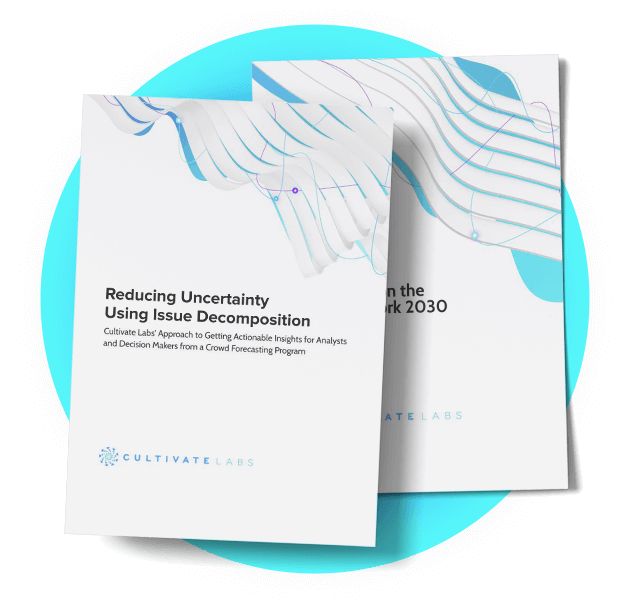Cultivate Labs Blog
Discussing how crowd forecasting, internal crowdfunding, and other new workplace trends can be used to improve the #futureofwork

Sign Up For Our Monthly Newsletter
By Jess Price on Feb 07, 2017
Cultivate Community February 2017 Newsletter
Our February 2017 newsletter is out: Take a look!
Read moreBy Adam Siegel on Jan 31, 2017
Is Toxic Culture Killing Your Company?
Thanks to the Illinois Technology Association (of which we are a member) for publishing our guest blog post on toxic corporate culture. We make the argument that before you can heavily invest in shiny new technology as you prepare for the #futureofwork, you should look to make positive changes to your culture first to take maximum advantage of your investment.
Read moreBy Vanessa Pineda on Dec 19, 2016
What Happens When You Provide a Refund Mechanism in a Crowdfunding App?
In the application itself, we created a feature you won’t find on Kickstarter - a “refund” button - to encourage employees to move their investments around.
Read moreBy Vanessa Pineda on Nov 22, 2016
How Trump Stumped the Prediction Markets
Why the prediction markets signaled the wrong result for the Presidential election.
Read moreBy Adam Siegel on Nov 17, 2016
Radical Budgeting: Introduce a Crowdsourced VC Model for Inside Your Organization
What if you tried to supplant the entire funding model inside organizations to not only mimic VC rounds, but use crowdfunding to decide what ideas/projects/initiatives should get resources?
Read moreBy Adam Siegel on Oct 13, 2016
Future of Work: What skills will be most valuable?
We recently had an article run in the Huffington Post about the future of work and what skills will be the most valuable given the new ways organizations will be structured and their desires to be more agile...
Read moreBy Cultivate Labs on Jun 09, 2016
Calling all Tornado Enthusiasts
How does probability forecasting play a role in informing conclusions as to when tornadoes, and of what size and frequency, will occur? More on this and the Summer Tornado Forecasting Contest.
Read moreBy Adam Siegel on May 10, 2016
Three Trends Set to Revolutionize How We Work
Our new white paper about "The Future of How We Work"
Read moreBy Adam Siegel on Apr 25, 2016
Disrupting Product Development Using Internal Crowdsourcing
Using crowdsourcing only at the front-stages of the product development cycle means organizations are missing out on a big opportunity to further tap the wisdom and knowledge of the organization. Here's how you can use internal crowdsourcing across your entire development lifecycle.
Read moreBy Adam Siegel on Mar 17, 2016
How Internal Crowdsourcing Will Transform the Way We Do Business
For years, companies of all shapes and sizes have utilized the power of the crowd to research, test, and drum up support for their products or service offerings. It makes sense — tapping into the external crowd can not only power idea generation at scale and in real time, but it can also drive engagement among your most important brand ambassadors.Traditionally, market research has dictated that customers (or people like them) are always the best sources of information. But this is limiting...
Read moreBy Adam Siegel on Feb 10, 2016
The Circle of (Work) Life
One of our developers left Cultivate recently to go work for a much larger company - an experience he has never had before. They are throwing more money at him than we ever could, and he will work on a team larger than our entire company...
Read moreBy Adam Siegel on Jan 11, 2016
Uber's Costly Fail in Germany is Symptomatic of an Age-Old Problem in Big Companies
It is incredible that a company of Uber's size, with the experience they have entering new markets is still having the kinds of colossal failures they are having in Germany. But Uber is certainly not alone in costly missteps like this and billions are being lost every year. Yet a solution already exists: your employees.
Read moreBy Ben Golden on Jan 08, 2016
Bayesian Reasoning and Prediction Markets
I enjoyed John Horgan's piece on Bayes Theorem for Scientific American. Bayes Theorem and Bayesian reasoning are highly applicable when thinking about forecasting and prediction markets; indeed, one prediction market built a Bayes Net into its platform. In this post I'll explain what Bayesian reasoning is, why it matters to prediction markets, and give a concrete (but semi-fictitious) example of how it's applied.
Read moreBy Ben Golden on Dec 16, 2015
What Is Liquidity And How Does It Affect Prediction Markets?
Our sites use a popular prediction market algorithm called LMSR to determine how markets adjust when someone makes a forecast, and how user scores are affected by making correct and incorrect forecasts.
Read moreBy Ben Golden on Dec 09, 2015
Forecasting Hard Questions
I've been trying to pick NFL game winners. I'm not using any complex analytical model; rather, I'm making decisions the way most sports bettors do--I watch some games, read the news, and use my judgment. I make each of my picks on SportsCast, which allows me to track my performance, interact with other forecasters, and track the performance of the prediction market--that is, the collective performance of all the forecasters on SportsCast.
Read moreBy Ben Roesch on Dec 08, 2015
Measuring Accuracy in Prediction Markets and Opinion Poll/Pools
One of the first and most important questions we get from clients, forecasters, and consumers of our data is: “How accurate are these forecasts?”. In order to answer this question, we have utilized and built upon a widely accepted proper scoring rule, i.e. a way to measure accuracy for a probabilistic forecast.
Read moreBy Ben Golden on Dec 04, 2015
Getting Started With Prediction Markets
Joining a prediction market can be confusing and anxiety-inducing. It's easy to be overwhelmed by all the questions, to not understand the forecasting interface, or to have trouble forming opinions to base forecasts on. All of this is pretty natural--as a now-experienced forecaster, I can remember these feelings the first time I joined a prediction market. In this post I'll address a few specific emotional barriers that make it difficult to start forecasting.
Read moreBy Ben Golden on Nov 23, 2015
Demystifying Unicorns Through Prediction Markets
On a recent podcast, Jack Schultz and I discussed two razor companies that are poised to become unicorn companies. Unicorns--startups that grow to billion-dollar valuations while remaining private--are somewhat mysterious and the subject of continuous speculation.
Read moreBy Cultivate Labs on Nov 19, 2015
Prediction Markets -- Beginner to Intermediate
Wikipedia’s intro paragraph for prediction markets is the following:Prediction markets (also known as predictive markets, information markets, decision markets, idea futures, event derivatives, or virtual markets) are exchange-traded markets created for the purpose of trading the outcome of events.
Read moreBy Jess Price on Nov 17, 2015
Logo is a four letter word: Branding Cultivate Labs
Creating a logo for a company can be a daunting task. In this post our Creative Director, Jessica Price explains how we landed on the final logo for Cultivate Labs.
Read moreBy Ben Golden on Nov 16, 2015
Predict Daily Fantasy Football Leaders on SportsCast
One use of prediction markets I've been really excited about is forecasting individual players' performances in major sports. These predictions are incredibly useful when playing fantasy sports--both daily fantasy and season-long leagues--and the forecasts that currently exist tend to be, in my experience, pretty mediocre. Prediction markets present an opportunity for the wisdom of the crowds to intervene, and will likely lead to more accurate forecasts.
Read moreBy Adam Siegel on Nov 09, 2015
Finding value in the much maligned "networking event"
While I’ll grant the naysayers that some networking events end up being a waste of time, I’ve been pleasantly surprised to find one aspect universally helpful: the ability to have short, 5 minute conversations with everyone I meet about our business.
Read moreBy Ben Golden on Oct 27, 2015
What Is A Prediction? What Is Crazy? Markets Can Help
Over at Grantland, Zach Lowe has published an article featuring 35 crazy prediction for the upcoming NBA season. Writes Lowe: For this to be fun, we have to find the sweet spot between bat-crap crazy and probable. Let’s all be wrong together!
Read moreBy Ben Golden on Oct 13, 2015
Prediction Markets In A World Hostile To Gambling
Two key take-aways from the emerging scandal surrounding Daily Fantasy sites: one, gambling data can be extremely valuable, and two: the only thing Americans love more than gambling is hating on gambling. Taken together, these findings illustrate why large-scale prediction markets present a path towards improving human knowledge in a wide range of topics.
Read moreBy Jess Price on Oct 06, 2015
VC's should be doing this
Amongst the leadership teams of the portfolio companies at any medium to large investment firm, there is an incredible amount of experience, wisdom, and perspective that is not collectively being taken advantage of.
Read more






















